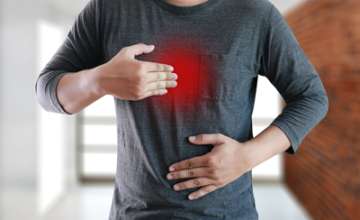Esophagitis
Find Your Care
We work as a team to provide outstanding esophageal care. Call 833-373-7674 to connect with a specialist at the UCLA Robert G. Kardashian Center for Esophageal Health.
What is esophagitis?
Esophagitis means inflammation of the esophagus, which is the muscular tube that connects the mouth to the stomach and allows the food bolus to pass through. Esophagitis is a macroscopic damage to the lining of the esophagus, manifesting as breaks in the lining or ulcerations.
What causes esophagitis?
Gastroesophageal reflux disease (GERD) is the most common cause of esophagitis. Gastroesophageal reflux is when stomach acid backs up from the stomach into the esophagus. Gastroesophageal reflux is a normal physiologic process and often does not cause symptoms, esophageal injury, or other complications. Gastroesophageal reflux becomes a disease (GERD) when it either causes symptoms or causes macroscopic damage to the esophagus. This macroscopic damage to the lining of the esophagus is called esophagitis.
Other less common causes of esophagitis include infections, certain medications, eosinophilic esophagitis, caustic ingestions, and some autoimmune conditions.
What are the symptoms of esophagitis?

Esophagitis can produce symptoms of chest pain (usually behind the sternum), heartburn, odynophagia (painful swallowing), and/or dysphagia (difficulty swallowing, sensation of food sticking). Rarely, esophagitis can be severe enough to cause bleeding.
How is esophagitis diagnosed?
Esophagitis is best diagnosed with an upper endoscopy. During the upper endoscopy, the esophageal inflammation can be directly visualized and the severity of the esophagitis can be determined. Esophageal biopsies can also be taken to evaluate for certain causes of the esophagitis if needed. Complications of esophagitis, such as bleeding, can also be treated as needed during endoscopy. Sometimes, esophagitis can be diagnosed on a barium swallow, where the esophagus is coated with swallowed barium and X-rays are taken, but this method is less sensitive than an upper endoscopy.
What are the treatment options for esophagitis?
Treatment for esophagitis varies depending on the cause of the esophagitis. For the common cause of reflux esophagitis, lifestyle changes and medical treatment for acid reflux (e.g. proton pump inhibitor) is used to heal the esophagus by decreasing esophageal exposure to injury from stomach acid.